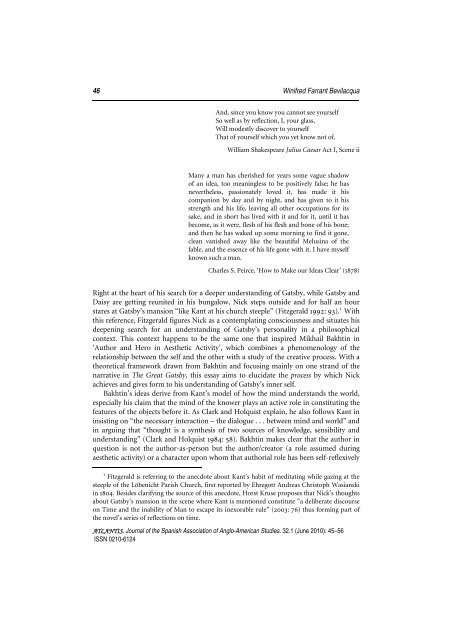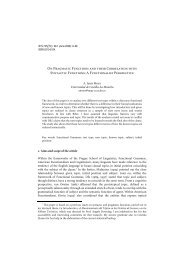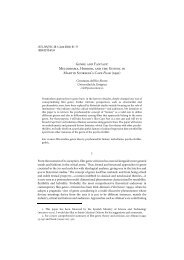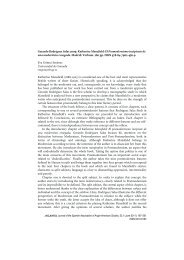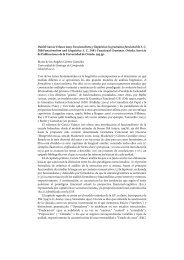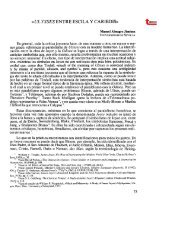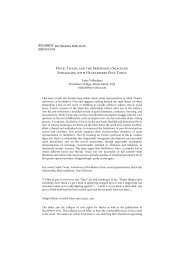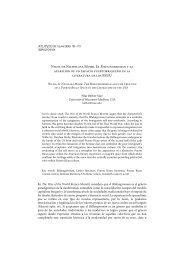Revista de la Asociación Española de Estudios Anglo - Atlantis
Revista de la Asociación Española de Estudios Anglo - Atlantis
Revista de la Asociación Española de Estudios Anglo - Atlantis
Create successful ePaper yourself
Turn your PDF publications into a flip-book with our unique Google optimized e-Paper software.
46 Winifred Farrant Bevi<strong>la</strong>cqua<br />
And, since you know you cannot see yourself<br />
So well as by reflection, I, your g<strong>la</strong>ss,<br />
Will mo<strong>de</strong>stly discover to yourself<br />
That of yourself which you yet know not of.<br />
William Shakespeare Julius Caesar Act I, Scene ii<br />
Many a man has cherished for years some vague shadow<br />
of an i<strong>de</strong>a, too meaningless to be positively false; he has<br />
nevertheless, passionately loved it, has ma<strong>de</strong> it his<br />
companion by day and by night, and has given to it his<br />
strength and his life, leaving all other occupations for its<br />
sake, and in short has lived with it and for it, until it has<br />
become, as it were, flesh of his flesh and bone of his bone;<br />
and then he has waked up some morning to find it gone,<br />
clean vanished away like the beautiful Melusina of the<br />
fable, and the essence of his life gone with it. I have myself<br />
known such a man.<br />
Charles S. Peirce, ‘How to Make our I<strong>de</strong>as Clear’ (1878)<br />
Right at the heart of his search for a <strong>de</strong>eper un<strong>de</strong>rstanding of Gatsby, while Gatsby and<br />
Daisy are getting reunited in his bungalow, Nick steps outsi<strong>de</strong> and for half an hour<br />
stares at Gatsby’s mansion “like Kant at his church steeple” (Fitzgerald 1992: 93). 1 With<br />
this reference, Fitzgerald figures Nick as a contemp<strong>la</strong>ting consciousness and situates his<br />
<strong>de</strong>epening search for an un<strong>de</strong>rstanding of Gatsby’s personality in a philosophical<br />
context. This context happens to be the same one that inspired Mikhail Bakhtin in<br />
‘Author and Hero in Aesthetic Activity’, which combines a phenomenology of the<br />
re<strong>la</strong>tionship between the self and the other with a study of the creative process. With a<br />
theoretical framework drawn from Bakhtin and focusing mainly on one strand of the<br />
narrative in The Great Gatsby, this essay aims to elucidate the process by which Nick<br />
achieves and gives form to his un<strong>de</strong>rstanding of Gatsby’s inner self.<br />
Bakhtin’s i<strong>de</strong>as <strong>de</strong>rive from Kant’s mo<strong>de</strong>l of how the mind un<strong>de</strong>rstands the world,<br />
especially his c<strong>la</strong>im that the mind of the knower p<strong>la</strong>ys an active role in constituting the<br />
features of the objects before it. As C<strong>la</strong>rk and Holquist exp<strong>la</strong>in, he also follows Kant in<br />
insisting on “the necessary interaction – the dialogue . . . between mind and world” and<br />
in arguing that “thought is a synthesis of two sources of knowledge, sensibility and<br />
un<strong>de</strong>rstanding” (C<strong>la</strong>rk and Holquist 1984: 58). Bakhtin makes clear that the author in<br />
question is not the author-as-person but the author/creator (a role assumed during<br />
aesthetic activity) or a character upon whom that authorial role has been self-reflexively<br />
1 Fitzgerald is referring to the anecdote about Kant’s habit of meditating while gazing at the<br />
steeple of the Löbenicht Parish Church, first reported by Ehregott Andreas Christoph Wasianski<br />
in 1804. Besi<strong>de</strong>s c<strong>la</strong>rifying the source of this anecdote, Horst Kruse proposes that Nick’s thoughts<br />
about Gatsby’s mansion in the scene where Kant is mentioned constitute “a <strong>de</strong>liberate discourse<br />
on Time and the inability of Man to escape its inexorable rule” (2003: 76) thus forming part of<br />
the novel’s series of reflections on time.<br />
ATLANTIS. Journal of the Spanish Association of <strong>Anglo</strong>-American Studies. 32.1 (June 2010): 45–56<br />
ISSN 0210-6124


